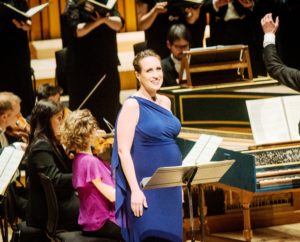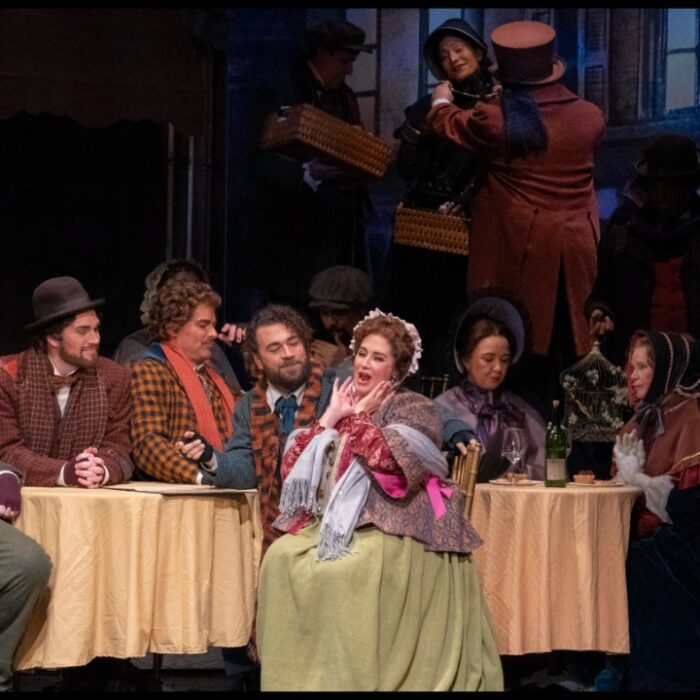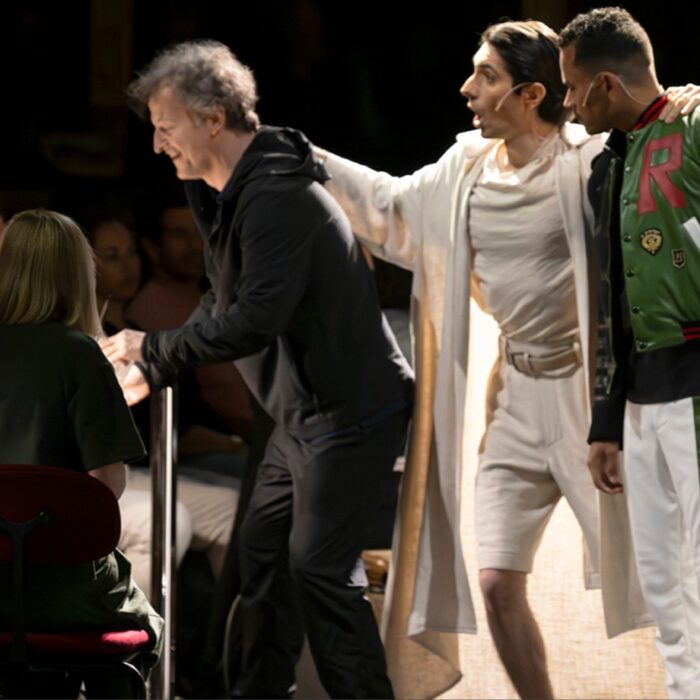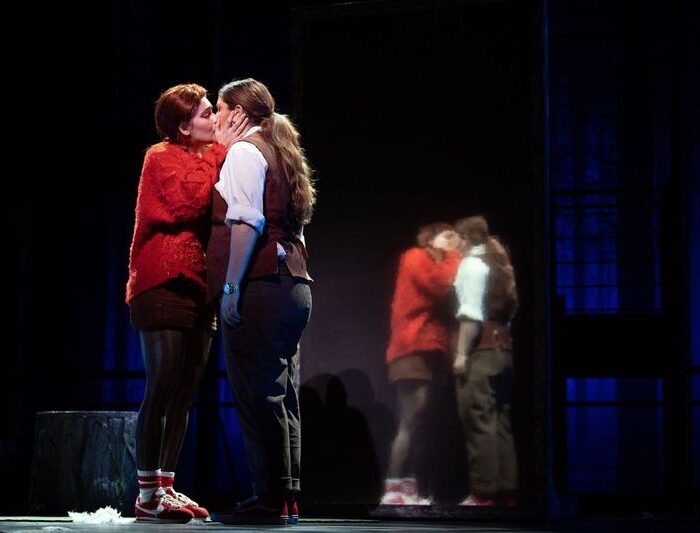
Théâtre des Champs-Élysées Paris 2019 Review: Semele
Another Triumph For Harry Bicket, The Master of Baroque
By Jonathan SutherlandAt the end of “Semele” the chorus sings “Happy, happy, shall we be.” The text is a perfect sobriquet for anything to do with Harry Bicket and the English Concert. Their forays into the world of baroque music are never less than an exhilarating experience for audiences and artists alike. Meticulous musicianship and a palpable passion for playing make their annual concert tours as eagerly awaited as Kris Kringle – except Santa Harry has a bounty of marvelous musical bonbons in his sleigh.
Last year’s “Rinaldo” was a succès fou in various European cities before receiving rave reviews in Carnegie Hall. This time it is Handel’s musical drama “Semele,” which is on generous offer. The work is rich in musical invention and with one of the principal protagonists being a priapic womanizing deity and the other a vain, social climbing sex addict, the plot is a bawdy sizzler. It is no wonder the prudish London Lenten audience in 1744 were fraught with righteous indignation and the work only received six performances in Handel’s lifetime.
Priests, Augurs, Loves, Zephyrs, Nymphs & Swains
Accompanied recitatives and chorus play an important role in this inescapably operatic oratorio. Priests, augurs, loves, zephyrs, nymphs and swains make no less than 10 entries during the course of the narrative. The U.S. based Clarion Choir was a worthy partner to the English Concert with some really impressive variations in vocal light and shade and admirable attention to dynamic markings and diction. The rests in “Cease, cease,” “Hail! Cadmus, hail,” and “Happy, happy” were as sharp as Lady Macbeth’s pugnale. The bellicose “Avert these omens, all ye pow’rs” was immaculately sung with crystal clear articulation prevailing over the pounding timpani. “How engaging, how endearing” was especially charming and the alla hornpipe “Now Love that everlasting boy invites” had suitably adolescent ardor. The fugal “Bless the glad earth” chorus which concludes Act two had power, precision and panache. The Purcellian “Oh terror and astonishment” chorus, when Semele turns to cinders, was suitably frightening with a subterranean pianissimo low F-natural from basses at “lost in smoke.” The final polyphonic fugal “Happy, happy” chorus with hallelujah-esque rowdy timpani and raspy trombe was a worthy conclusion to an absolutely outstanding choral performance. Two choir members sang solo passages.
Joseph Beutel was a slightly unfocused Priest, but Brian Giebler brought impressive legato and attractive timbre to Apollo who brings the good news that a phoenix, actually baby Bacchus, will rise out of Semele’s ashes. A number of F-sharps were especially refulgent and Giebler has excellent breath control and an appealing light vocal color, not unlike that of Benjamin Hulett. Regrettably the small role of Cupid and his “Come, Zephyrs” aria was cut.
Truly High Standard
For the most part the soloists were of a consistently high standard. Soprano Ailish Tynan made a big impression as Juno’s long-suffering side-kick Iris. Her smiling Irish eyes suggested more than a beag of naughtiness. Producing a crumpled road map in response to Juno’s question “Say, where is Semele’s abode?” was an unexpected and amusing bit of business. This was followed by waving a mock-up copy of a “Hello!” magazine cover showing a cheesy pic of Semele and Jupiter as a star couple heading the A-list of Pantheon celebrities. Juno was definitely not amused. “There, from mortal cares retiring” was full of sparkling trills and runs. “Forky stings” and “scaly horrors rise” were a model of impeccable descriptive diction. This was a small-part tour-de-force performance with a knock-out B-flat in the da capo for good measure.
American countertenor Christopher Lowrey was an appealing enough Athamas, but one missed the variations in tone color that Jakub Józef Orliński brought to the secondary role of Euzebio in “Rinaldo” with Harry Bicket last year. One of the few cuts was Athamas’ “Hymen haste” aria, which was dramaturgically justifiable but deprived the young singer of displaying more vocal artistry. The scales in “Despair no more shall wound me” were more consistent, although the roulades on “joy and bliss” lost focus. An interpolated cadenza on “my soul is tun’d to love” was more successful.
American bass Soloman Howard has an imposing stage presence and a huge warm sound not unlike that of Willard White. Singing both Cadmus and Somnus, the lower tessitura of the latter role seemed more comfortable than the generally higher range of Semele’s father. His opening “Daughter obey” was dramatically emphatic but intonation could have been sharper. Howard’s projection was consistently strong as befitting a Verdi and Puccini bass. The young bass’s diction should have been much more crisp; articulation in the “Why dost thou thus untimely grieve” quartet and “Wing’d with our fears” recitative was noticeably fuzzy. Somnus’ snoozy “Leave me, loathsome light” had better diction and some impressive sustained D-naturals and a killer low F-sharp on the concluding “peace,” but “More sweet is that name” reverted to smudgy articulation.
Flawless Yet Missing Character
The dissolute deity Jupiter was sung with ravishing dolcissima by English tenor Benjamin Hulett. Whilst musically flawless, the sweet timbre of the voice somehow doesn’t quite fit the persona of a selfish serial fornicator. Admittedly Jupiter has been sung by similar lighter tenors such as Robert Tear and Anthony Rolfe Johnson, but the metal Rockwell Blake injected into passages such as “By that tremendous flood, I swear” in Carnegie Hall in 1985 was clearly closer to the character.
That said, Hulett brought an exquisite cantilena and superb phrasing to “Where’ere You Walk” which was sung exactly “largo e pianissimo per tutto” as marked. The notes around G-natural are particularly pastel in Hulett’s pristine vocal palette and the ornamentation in the da capo was the epitome of subtle refinement. Despite the sensitive but decidedly un-schmaltzy accompaniment by the English Concert, the most famous aria from “Semele” received no applause from the pernickety Parisians.
Jupiter’s opening “Lay your doubts and fears aside” had an easy triple time lilt and seductively smooth roulades, reaching comfortable A-naturals – even if the line “Love and I are one” can hardly be sung with modesty. Hulett’s splendid word coloring in “Why sighs my Semele?” was as impressive as Jupiter’s testosterone levels whilst the three-bar roulades on “explain” and “complain” in “I must with speed amuse her” were immaculately sung. “Come to my arms, my lovely fair” was touching in its affection, even if Jupiter is in fact a shameless fornicator. Similarly the accompanied recitative “She must a victim fall” was palpably tender, despite the oversexed deity merely contemplating to make his fatal lightning bolts only mildly incendiary.
Broadening The Scope
Elizabeth DeShong is a singer whose rising career is as impressive as her enormously broad repertoire. Current roles range from Handel and Rossini to Mahler, Verdi, Britten and even Sondheim and Rodgers and Hammerstein. Singing roles of both the sensitive sorella Ino and Fricka-esque Juno, the young singer seemed more interested in the meatier vindictive goddess. Diminutive in stature DeShong is nevertheless a hefty powerhouse of vocal avoirdupois.
The American mezzo has a rich chocolate chest register which gives low B-flats such as on “invading” a Resnik-esque solidity and strength. “You’ve undone me” was so Mistress Quickly molasses one could have believed Ino was as physically violated as her wanna-be immortal sister. “Awake, Saturnia” was a pudding full of plums with low C-naturals and a graphic B-flat on “fall” adding to the fury. The mid D-natural to low A-natural scale on “Rolling down to the flood of Acheron” was masterful with a Cruella de Vil callousness.
“Hence, Iris, hence away” could have been Lady Macbeth’s “Or tutti sorgete” and DeShong lapped up the rapid roulades with low B-flat’s on “cell” and pungent C-naturals on “wakeful dragons’ eyes.” Unsurprisingly the aria received huge cheers and applause.
Taking serene sister form, Ino’s “But hark, the heav’nly sphere turns round” evinced DeShongs capacity for pianissimo and legato singing with some fruity chest-note C-sharps whilst the feisty accompanied recitative to “Somnus, awake” was full-on feisty Fricka. The Juno/Somnus “Obey my will” duet was Ortrud at her most malign with some sepulchral low E naturals on “shall be thine.” DeShong’s deliberately deceptive advice to Semele in the “Conjure him by his oath” recitative had plenty of venom with a particularly snide snarly “bed”.
The Title Role
In the title role Brenda Rae had much to offer, despite an occasionally intrusive fast vibrato such as during the “Shall I my sister see” recitative. Some stratospheric top notes testified to her expertise in roles such as Gilda. Seattle heard Rae as Semele way back in 2015 and she has clearly made multiple refinements in her interpretation since then, especially when led by such a Handel expert as Harry Bicket.
Her opening “The morning lark to mine accords his note” aria had plenty of light, clean A-natural trills on “return” with crisp appoggiaturas and the downward scales were even and tastefully phrased. There was warbling aplenty with some interpolated above the stave ornamentations which were as elegant as they were exact. The feathery, flirtatious “Endless pleasure, endless love” followed the spirit of the “alla gavotte” markings and Rae was as much a tentatrice assoluta as Dalilah.
Long C-major roulades were effortless and a capricious cadenza made a delicious end to the first Act. “O sleep why dost though leave me” was a model of exceptional legato and even phrasing. “With fond desiring” in coquettish 6/8 time exhibited Rae’s fine sense of word coloring with “panting, fainting” and “rashly trusting” being particularly effective. Extended semiquaver roulades were expertly executed. “Myself I shall adore” is a sparkling panegyric to vanity with suitably frothy frivolous ornamentation. Four-bar roulades, endless trills and Queen of the Night staccato chirpings became even more excessive in the mega-flamboyant da capo which reached a dazzling interpolated high F-natural. As the longest set piece in the opera, it is an absolute show-stopper, foreshadowing Bernstein’s “Glitter and be gay” by almost two hundred years. Brae’s scintillating performance was deservedly cheered to the imposing plafond. Semele’s fatal request for Jupiter to take his own shape with taxing seven bar roulades on “alarm” displayed Brae’s excellent breath control and fiery fioratura. “Ah me, too late I now repent” was suitably self-pitying although curiously the hedonistic heroine departs with much more whimper than bang.
The English Concert is considered one of today’s finest baroque ensembles. Each musician plays with such passion and commitment it is as if they are individual soloists in a virtuoso concerto. However the ensemble maintains an incomparable cohesion and synchronicity especially in the many rallentandi and original tempo variations in Handel’s constantly shifting score. Concert master Nadja Zwiener is particularly is riveting to watch and clearly inspiring to the other players. Special mention should also be made of first cello Joseph Crouch. His introduction and obbligato to Ino’s “Turn, hopeless lover” and Semele’s “O sleep, why dost thou leave me” was sensitive and deeply moving. The latter was so somnolent it was if an aural dose of Estazolam had wafted down the recherché avenue Montaigne. Similarly, the solo cello in “Come to my arms, my loveley fair” was Petrarchan poetry.
Music lovers in search of the highest caliber of music-making in the U.S. can hear this superlative concert version of “Semele” this month in Dartmouth NH on the 10th; Ann Arbour MI on the 12th; New York NY (Carnegie Hall) on the 14th and Philadelphia PA on the 16th. This is definitely a case of beg, borrow, buy or steal a ticket. As Semele herself promises, Harry Bicket, the English Concert, distinguished soloists and the Clarion Choir provide what is unquestionably an evening of “endless pleasure.”


